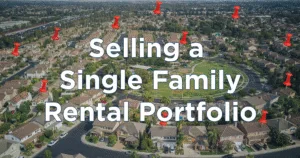In my early days in real estate, I was in the same office as someone called a “Lifer” – another realtor who had been selling real estate for over 50 years.
This realtor routinely made first or second mortgages to buyers to help them purchase a home that he had listed. With his first-hand knowledge of both the real estate that backed the loan and the buyers coming into the purchase, offering the mortgages made for a secure repeat investment.
However, in 2010 when the Dodd-Frank Act was passed, private individuals like the Lifer were prevented from lending to consumers for buyer-occupied first homes, unless they were licensed lenders.
But there’s still an active market for investors to get into this field by purchasing real estate-backed notes from lenders or purchasing commercial/investment loans. Investing in real estate-backed mortgage notes offers an alternative – and often lucrative – way to participate in the real estate market, without the challenges of owning and managing physical property.
Understanding Real Estate-Backed Mortgage Notes
A mortgage note is a legal document that represents a loan secured by real estate. Essentially, when someone buys a home and finances it with a mortgage, the lender holds a promissory note – the mortgage note. The note specifies the loan amount, interest rate, repayment schedule, and other key terms. Mortgage notes are typically secured by a lien on the property, which means that the lender (or note holder) has a claim to the property if the borrower defaults on the loan.
Mortgage note investing can include both commercial and residential loans, and both owner-occupied and rental housing. There are two primary types of mortgage notes that investors can purchase: performing and non-performing.
Performing Notes
Performing notes are when the borrower is making regular, timely payments. These are generally safer, as there is a reliable cash flow from the borrower.
Types of Performing Notes
Conforming Loans: These are notes that are paid on time and fit standard lending parameters.
Loan Modifications: These notes are usually originated by banks, but have been modified from their original terms (hence, “modification”). Most modifications are initiated at the behest of the borrowers who had a financial setback – like a job loss, medical crisis, or divorce – but want to stay in their homes. Most people assume these are “bad” notes, but that is not necessarily true. Many borrowers recover from their financial setbacks and become faithful payers, grateful to keep their homes.
Hard Money Loans: These are often short-term bridge loans made to house rehabbers who need capital to purchase and flip a home. Hard money loans are usually made to an investor who becomes the borrower. The goal is to rehab the property and either sell it or refinance at better terms within a short period.
Non-Performing Notes
These are loans where the borrower has stopped making payments. Investors can purchase these at a significant discount, but non-performing notes involve higher risk. They also require more active management, as the investor may need to restructure the loan or foreclose on the property.
Benefits of Mortage Note Investing
Investing in mortgage notes can be highly appealing for several reasons.
1.Consistent Cash Flow
For performing mortgage notes, the investor receives regular payments of interest and principal from the borrower. These payments can provide consistent, passive income, often with yields higher than traditional bonds or dividend-paying stocks. In some cases, the interest rates on mortgage notes can range from 6% to 12%, depending on the terms of the loan and the risk profile of the borrower.
2.Discounted Purchase Prices
In the case of non-performing notes, investors can acquire mortgage notes at significant discounts, sometimes as much as 20% to 70% off the loan’s face value. The discounted price provides a margin of safety and the opportunity for higher returns, particularly if the investor is successful in working out the loan with the borrower or acquiring the underlying property through foreclosure.
3.Control Over Investment Outcomes
Unlike other passive investments, mortgage note investors have some degree of control over the outcome. For instance, if a borrower is behind on payments, the investor can renegotiate the terms, reducing the interest rate or extending the loan’s term to make the payments more manageable. This flexibility can create opportunities to recover non-performing loans and restore them to performing status, increasing the value of the investment.
4.Diversification
Real estate-backed mortgage notes offer diversification benefits for an investment portfolio. They are not directly correlated to the stock market or other traditional assets, providing a hedge against market volatility. Investors who are looking to spread risk across different asset classes may find mortgage notes to be a compelling option.
Note investing can be an excellent option for a self-directed IRA or Solo 401K. Since retirement accounts do not benefit from the tax benefits built into direct real estate investing, notes can be an excellent addition for the real estate addict who wants real estate in their retirement accounts!
Risks of Mortgage Note Investing
Like any investment, mortgage note investing comes with its risks. Understanding these risks is crucial for managing them effectively and ensuring that the investment aligns with your financial goals and risk tolerance.
1.Borrower Default
One of the primary risks is that the borrower may default on the loan, leading to missed payments. While this risk is lower with performing notes, it is still a possibility. In the case of non-performing notes, default is already a given, so investors must be prepared to take action such as foreclosure – which can be time-consuming and costly.
2.Property Depreciation
Since mortgage notes are secured by real estate, the value of the underlying property is critical. If the property loses value, it can affect the note holder’s ability to recoup the full investment in the event of a foreclosure. Investors should conduct thorough due diligence on the property’s value and condition before purchasing a note.
3.Foreclosure Costs and Delays
When investing in non-performing notes, foreclosures can become necessary if the borrower does not resume payments. However, the foreclosure process can be lengthy, complicated, and expensive, particularly in states with judicial foreclosure processes. Investors need to be prepared for the costs and delays associated with foreclosing on a property.
4.Liquidity Risk
Mortgage notes are not as liquid as stocks or bonds. If an investor needs to access cash quickly, selling a note may take time, and the price received may not reflect the note’s true value. Investors should be prepared for the possibility of holding the note for an extended period or accepting a discounted price if they need to sell quickly.
Sources of Loans
Mortgage notes are mostly purchased from banks, mortgage bankers, and other residential mortgage loan originators that are in compliance with RESPA, the SAFE Act, and the Dodd-Frank Act when applicable.
Why do they not come from private lenders?
The Dodd-Frank Act prohibits private money financing when the property is a buyer’s principal residence unless the mortgage goes through a licensed mortgage originator. The mortgage originator provisions apply to residential mortgage loans made on a buyer’s principal residence. It does not apply to residential mortgage loans made on a buyer’s second home or investment property.
Types of Note Purchases
1.MBS Packages
Notes can be purchased as packages bundled together with other mortgages and then sold, known as mortgage-backed securities. Usually, MBS are sold through exchange-traded funds (EFTs) which can be purchased through investment advisors or an online brokerage account.
2.Individual Notes
Websites like Paperstac allow investors to sell or purchase individual mortgage notes directly. There are also groups on social media sites like LinkedIn that pair buyers and sellers. If you’re looking to purchase a commercial mortgage note, websites like Ten-X offer them at auction.
3.Partial Notes
Notes can be purchased in part, with the holder receiving just a stream of income while the servicer collects payments and holds the primary note. Syndication of notes offers private ownership as part of a group or fund.
Conclusion
For investors looking for more passive options, purchasing mortgage notes after origination can be a great way to add a lucrative holding and diversify their investing strategy.
Many of the investors we work with appreciate our diverse approach to their strategy, ensuring that their hard-working capital is producing the best possible return. Contact us today for a strategy meeting to see where you investments can be improved.
Videos
Looking for more passive investment opportunities that keep your money in real estate but don’t require active management? How about these:
Sources
https://berlinpatten.com/dodd-frank-seller-financing-and-private-money-financing/
https://www.theownerfinancenetwork.com/rmlo-services/
https://mct-trading.com/blog/broker-to-banker/
https://capitalmarkets.fanniemae.com/mortgage-backed-securities






